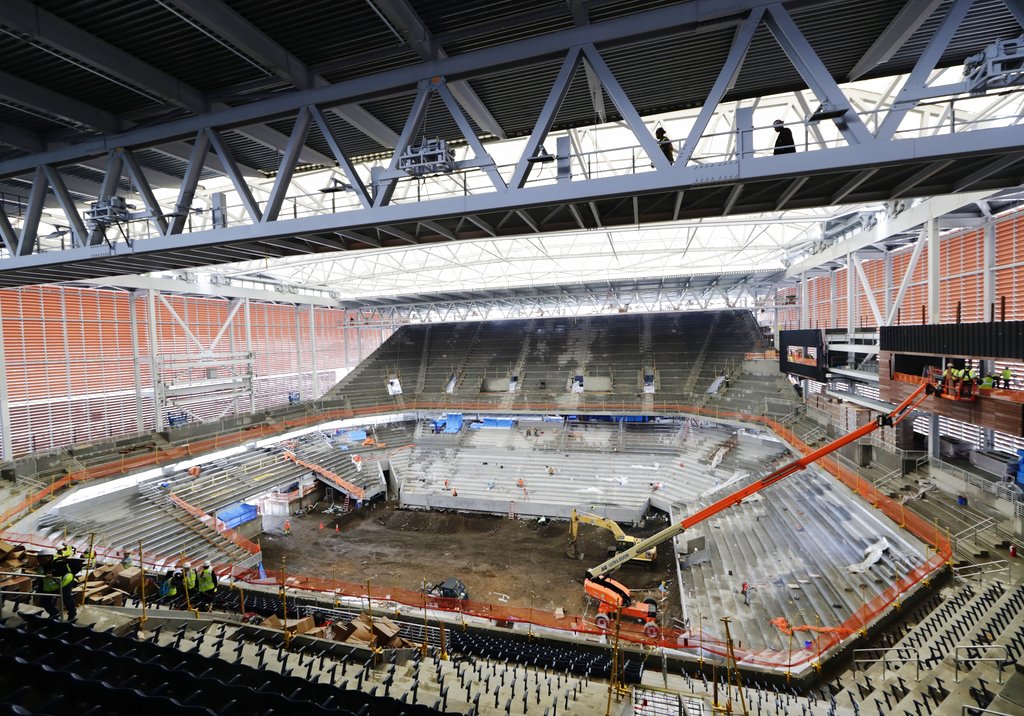US Open set to open second roofed stadium with new Armstrong

Construction crews work on the Louis Armstrong Stadium at the Billie Jean King National Tennis Center Thursday, May 17, 2018, in New York. (AP Photo/Frank Franklin II)
NEW YORK — The old No. 1 stadium at the U.S. Open is about to be replaced by a better-than-ever No. 2.
Louis Armstrong Stadium hosted two decades of championship tennis, memorable matches on the court that often hid its inadequacies off it.
Rain would send spectators scattering, fleeing onto crowded concourses and toward cramped restrooms.
Not anymore.
When the new Armstrong opens for play in August at the U.S. Open’s 50th anniversary, complete for the first time with both a day and night session, the U.S. Tennis Association believes its second stadium will be second to none.
Topped by a retractable roof, it’s the final stage of a five-year, $600 million project that remade the USTA Billie Jean King National Tennis Center, all without ever interfering with the tournament.
And as USTA officials showed off the progress of the stadium Thursday under rainy skies that were forecast to last into the weekend, it was comforting to know they now had two places where they could keep the action going if faced with the same weather in late summer.
“Now with two stadiums with roofs, you know that if you’ve got a ticket to the U.S. Open, you’re going to see tennis, regardless of the weather conditions,” USTA President Katrina Adams said.
The roof over the main Arthur Ashe Stadium has been operational since 2016, the middle of a transformation that included a new Grandstand stadium and additional seats on outer courts.
Work began on the new Armstrong following that tournament. A temporary, 8,500-seat Armstrong was constructed for last year’s event while work continued on the new $200 million Armstrong that will seat 14,000 and stands about 95 percent completed.
It will be the first naturally ventilated stadium of its kind with a retractable roof, as openings at the north and south end allow outside air to flow through even when the roof is closed, which will take less than five minutes. Usually, some form of air conditioning is needed to cool a stadium when the roof isn’t open.
The stadium fits almost entirely in the footprint for the original Armstrong and Grandstand, which was constructed where the Singer Bowl was built for the 1964 New York World’s Fair. The U.S. Open would move there for the 1978 tournament and Armstrong would remain the main stadium until Ashe opened in 1997.
“For 40 years we made great use of that stadium. The magic on court and history and what went on has always been spectacular but quite frankly the fan experience was maybe subpar at best,” said Danny Zausner, the chief operating officer of the National Tennis Center. “They were so lost in the action on the court they never really recognized that those bathrooms were built for the ’64 World’s Fair.”
The new restrooms and concession stands will be four times bigger, and fans will be able to see the action on the court from the expanded concourses. The seating capacity that was 10,500 in Armstrong’s final years will increase, with 6,600 reserved seats in the lower bowl and 7,400 general admission ones upstairs.
“We’ve got so much more open space, so the days of seeing maybe 500 people standing in line outside to try to get into the stadium should hopefully go away, because we have that many more seats,” Zausner said.
The Armstrong schedule will feature three day-session matches for the first nine days of the year’s final Grand Slam tournament, and a night session with two matches for the first six days. And the best part for those ticket holders, as with the ones who had Ashe seats for the last two years, is they are going to see tennis.
“For this year’s U.S. Open, we can guarantee up to 40,000 fans that if we were to get rain — hopefully we won’t, but if we do — that between these two stadiums 40,000 people will be able to watch tennis uninterrupted,” Zausner said.